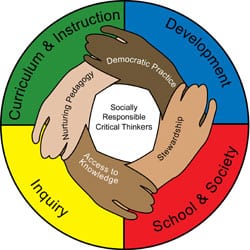Our Mission

The mission of the School of Education at Maryville University is to prepare socially responsible critical thinkers who are collaborative and reflective educators committed to the moral endeavor of schooling in a democracy.
The moral purposes of schooling, derived from the National Network for Educational Renewal, provide the foundation for School of Education programs. We believe teachers have the responsibility to:
- Stewardship of the school – work at their own teaching and the teaching of others as well as collaborate with others in practices that serve the school, its students and the larger community.
- Pedagogical nurturing – nurture their own pedagogical skills so that each child develops to her/his highest potential within a caring learning community.
- Access to knowledge – provide equitable access to knowledge for ALL students based on developing understanding of the unique strengths and needs of students within the context of culture.
- Enculturation into a social and political democracy – model behaviors and create opportunities that help students learn and practice caring, fairness, tolerance, and responsibility.
As learners in the School of Education, we seek out perspectives and skills that enhance our experience, understanding and appreciation of diversity in individuals, curricula, and practice.
The School of Education is committed to working with our school and community partners in the simultaneous renewal of schools and teacher education.
The Four Conceptual Strands
Four conceptual strands flow through all teacher education programs at Maryville. Arising from our mission and the research on the profession, these strands give structure to the reflective practitioner model we use: a developmental strand, a curriculum and instruction strand, a school and society strand, and finally, a research and inquiry strand. Click here for research references.
Outcomes – Initial Certification
These are the final outcomes for the preservice teachers of Maryville University. They stem from the School of Education’s mission and the knowledge of the preparation of teachers, organized by the four conceptual strands.
Outcomes – Masters of Arts in Education
The Master of Arts in Education is designed for teachers who want to renew and re-examine their professional practice. The same moral purposes and conceptual strands guide all programs for teachers at Maryville University. The outcomes also relate to National Board Propositions.
Outcomes – Educational Leadership
Educational Leadership programs at Maryville University, both masters and doctorate levels, are constructed around three recurring themes that emerge from the conceptual model.
Outcomes – Higher Education Leadership
The doctorate in Higher Education Leadership program addresses critical issues in higher education and prepares leaders to meet the challenges of today and the future. The curriculum is grounded in four program outcomes: 1) The People which includes ethical and reflective leadership, communication skills, and innovation; 2) The Institution which focuses on analyzing problems of practice and using multiple frames to develop and defend solutions; 3) The Context which refers to understanding the impact of environmental forces on higher education; and 4) The Research which emphasizes the ability to analyze, understand, and use data to conduct scholarly research.